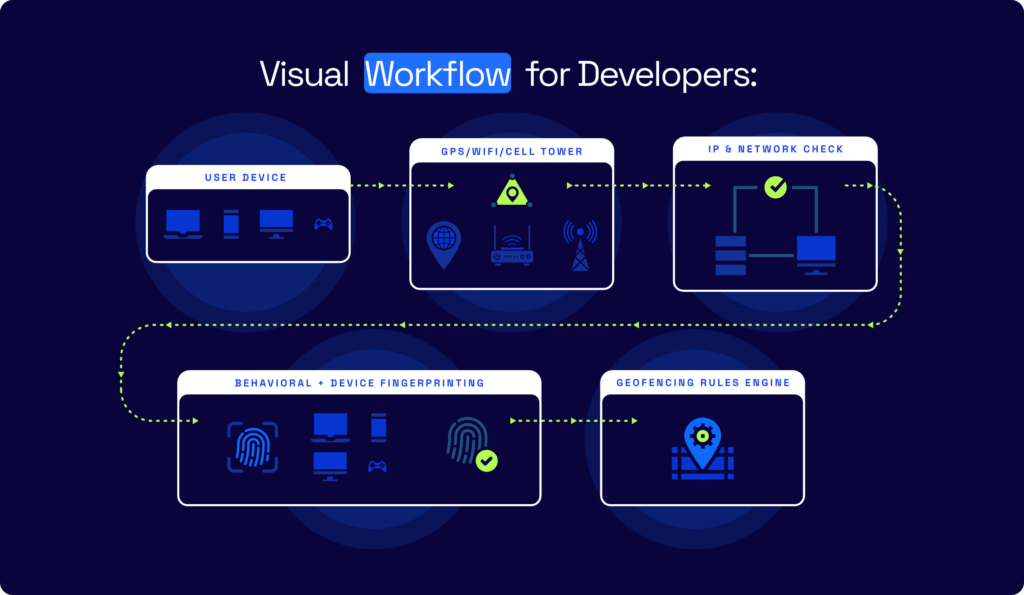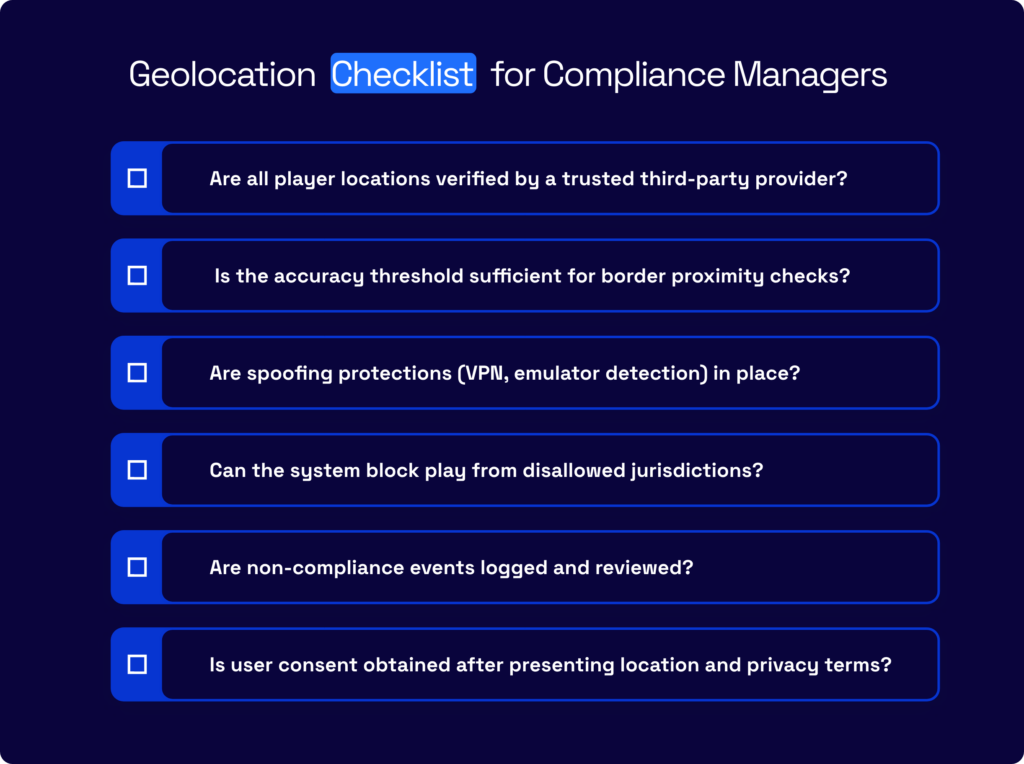The reality of geolocation compliance in daily fantasy sports
May 9, 2025

Executive Summary
As daily fantasy sports (DFS) platforms expand, ensuring accurate and compliant geolocation services becomes critical to success. DFS operators face a complex matrix of regulatory requirements, payment processor expectations, and operational risks related to location verification. This article outlines why geolocation compliance is more than a technical requirement—it is a cornerstone for legal operation, user trust, and business continuity. We explore pitfalls, outline best practices, and offer a checklist for stakeholders to assess their own readiness.
The reality of geolocation compliance in daily fantasy sports
As daily fantasy sports (DFS) platforms grow in popularity, so does the need to ensure geolocation compliance. Although DFS has historically operated under a lighter regulatory touch than traditional sports betting or online casinos, shifting expectations from regulators and payment providers present both compliance challenges and opportunities for differentiation.
Whether you’re a new or growing DFS operator, understanding the evolving landscape of geolocation compliance is critical to ensuring seamless operations and business growth.
Why is geolocation compliance important for DFS?
Beyond concerns around legal enforcement, DFS operators must also navigate stringent policies from payment processors and vendors such as Visa and PayPal. These companies increasingly require proof that users are participating from approved jurisdictions to comply with the Unlawful Internet Gambling Enforcement Act (UIGEA), which prohibits knowingly accepting payments tied to unlawful internet gambling activities.
More payment vendors now demand third-party verification of player locations to ensure transaction legality across state lines. Certain DFS operators attempt to build their own in-house geolocation solution, but often face skepticism from processors, who see a clear conflict of interest. This means that using internal geolocation technology can raise red flags with payment processors. Working with a trusted geolocation services vendor like Locance removes that friction and keeps your revenue streams flowing without interruption.
Operational risk
Lax location controls expose DFS platforms to a variety of costly operational risks. Without real-time verification, platforms become vulnerable to:
- Fraudulent play and bonus abuse: Bad actors can exploit loose geofencing to play or claim bonuses from within prohibited or non-qualified regions, eroding margins and inflating false engagement metrics.
- Chargeback surges. Transactions that originate from restricted jurisdictions are far more likely to be disputed or reversed, driving up merchant fees, tying up working capital, and triggering penalties from payment processors.
- Regulatory audits and fines. Inadequate location services invite scrutiny from both state regulators and federal agencies. Incidents of non-compliance—such as allowing play from a banned state—can incur substantial penalties and extended audits that stall growth.
- Reputational harm. Publicized compliance failures undermine user trust and partner confidence, making it harder to onboard new payment processors, attract investors, or secure license renewals.
A robust solution like Locance enables your platform to block play from prohibited regions in real time, flag suspicious patterns, and investigate non-compliant events with forensics tools. Having access to these capabilities under one system reduces fraud and chargeback risk, demonstrates regulatory diligence, and safeguards both your bottom line and your reputation.
Common DFS geolocation pitfalls
The challenges of geolocation compliance in DFS go far beyond identifying whether a player is situated inside or outside a state line. Here are a few of the most common pitfalls:
Spoofing and VPN usage: Savvy users may try to spoof their location using VPNs or device manipulation. A dependable geolocation compliance system must catch these attempts in real time and enforce restrictions without impacting the user experience.
Borderline location inaccuracies: Many solutions built in-house fail to account for users who are physically close to state borders. If your accuracy threshold is 1,000 meters and a player is 500 meters from a restricted area, for example, you’re inviting legal and operational risk.
Chargeback fraud and multi-accounting: Users may create multiple accounts linked to the same IP or physical location, exploiting bonus structures or committing fraud. A geolocation services vendor should offer location analytics and forensic reporting tools that allow operators to identify clusters of suspicious activity to block specific addresses or regions proactively.
What a strong geolocation compliance system looks like
For a DFS platform, a strong geolocation compliance system goes beyond IP address checks. For example, Locance offers a multi-layered verification approach, combining:
- IP location and connection analysis: Identifies VPNs, proxies, and anonymizers to verify true IP location.
- Browser and app-based location services: Uses GPS, Wi-Fi, and cell tower data to confirm real-time device location with high accuracy.
- Device profiling and behavioral analytics: Detects emulators, remote access, or virtual machines that users may deploy to spoof location.
- Geofencing and boundary checks: Automatically assesses how close a user is to restricted areas, triggering alerts or blocking access.
- Real-time forensic reporting: Helps DFS operators analyze non-compliant events and make informed decisions to prevent repeat violations.
No geolocation compliance approach should be one-size-fits-all. Configurable options are critical to address your unique requirements. For instance, Locance allows you to customize your compliance mode — ranging from full regulatory coverage to a lighter, internal risk-protection mode where needed.
See more geolocation best practices for online gaming in our latest white paper.

Preventing spoofing without compromising UX
Location spoofing is one of the most persistent geolocation compliance challenges for DFS operators. Users may attempt to bypass restrictions by masking their true location using VPNs, proxies, or tampered devices. To combat this, you need a layered defense strategy that goes beyond simple IP checks. Effective mitigation combines techniques such as:
- App and browser-based location verification
- Device fingerprinting
- Behavioral analytics
- Real-time data correlation
Integrated and intelligent uses of these methods help detect inconsistencies — like a player logging in from a U.S.-based IP address while their device location shows an international origin. Many of these safeguards can be deployed passively in the background, minimizing friction and preserving a smooth user experience.
User privacy should also remain a priority. Modern geolocation solutions are designed to obtain player consent, offer transparency about data collection, and integrate seamlessly with the platform’s existing UX, without intrusive downloads or performance slowdowns. For DFS operators, the goal is striking the right balance between compliance and convenience.
Developer considerations for geolocation compliance technology
- Integrate SDKs or APIs that support multi-source verification.
- Perform checks during login, session activity, and payment initiation.
- Address location spoofing and suspicious device settings.
- Use geofencing with configurable tolerance thresholds.
- Log compliance results for analysis and audit trail purposes.

Download Checklist
The cost of getting it wrong
Ignoring geolocation compliance measures can lead to substantial penalties, especially as regulators ramp up enforcement in online gaming. For DFS operators, even isolated lapses in location controls can raise red flags, threaten payment processor relationships, and lead to significant financial and reputational damage. Payment processors may suspend service if they detect that transactions originate from jurisdictions where play isn’t authorized, cutting off your revenue pipeline until issues are resolved.
Given the patchwork of state and international laws around DFS, it’s critical for platforms to remain agile. Having systems in place that allow for fast rule updates, configurable geofencing, and adaptable verification thresholds helps teams stay compliant as regulations shift.
International considerations
While DFS apps operating in the U.S. must adapt state-by-state, international operation introduces even more complexity. Countries differ widely in how they define games of skill, gambling, and permissible location verification techniques. It’s important to ensure your compliance strategy is adaptable to foreign regulatory frameworks.
Enhancing the user experience through location
When implemented thoughtfully, geolocation services enhance—not hinder—user experience. For instance:
- Automatically routing players to a compliant, state-specific version of your game
- Displaying location-relevant promotions and payout methods
- Minimizing user distraction by operating in the background
Embedding geolocation into your product design from the outset supports both regulatory compliance and player satisfaction.
Need help future-proofing your geolocation compliance for DFS? Learn how Locance can support your platform with customizable, multi-layered solutions and sign up for a free trial today.








